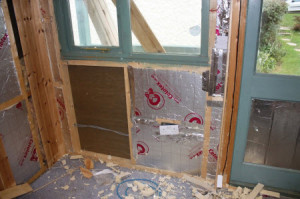 A client was recently asking why his shed was always cold. He had spent over $1000 insulating it with insulation, proper windows, and doors. His wife was quite frustrated and felt that he had wasted his money. He was wondering what he should do and how he could recover his investment. The questions of why is my insulated shed cold is a common one. Yet it has a relatively easy answer. Insulation placed in walls, floors, and ceilings of any structure do not generate heat. The insulation slows the passage of heat through the wall, preserving the temperature of the room or structure at whatever level it is at.
A client was recently asking why his shed was always cold. He had spent over $1000 insulating it with insulation, proper windows, and doors. His wife was quite frustrated and felt that he had wasted his money. He was wondering what he should do and how he could recover his investment. The questions of why is my insulated shed cold is a common one. Yet it has a relatively easy answer. Insulation placed in walls, floors, and ceilings of any structure do not generate heat. The insulation slows the passage of heat through the wall, preserving the temperature of the room or structure at whatever level it is at.
The keyword here is that it slows the passage of heat through the insulated barrier. In the summertime the interior can be cool because the insulation is keeping the outdoor summer heat from penetrating through the walls. In the winter, the reverse is true. However, unless you have a heat source there will be no heat to pass through the insulation. Windows and doors have different insulating properties. For example, a window will allow the sun’s rays to pass through the window. The radiation from the sun will heat up the interior of the room in the winter as well as the summer.
Solutions for Why is My Insulated Shed Cold
In the wintertime, use a small electric heater if you are able. It will add sufficient heat to make a small insulated room comfortable. If you do not have an electric heater or there is no electricity, you can use a gas stove, a propane stove or a wood stove. In all cases make sure there is proper ventilation for the stove to the outside. Your shed will remain warm. It will stay that way for a longer period if the walls and ceiling is well insulated.
The summertime is quite different. Your shed will remain cool. It will as long as the doors and windows are closed and the windows do not allow the sun’s rays to penetrate. The insulation in the walls etc. will prevent the heat of the summer months from penetrating. On cool nights you can open the windows to cool off your shed since some heat will always pass through the walls, windows, and doors depending on how well they are insulated.